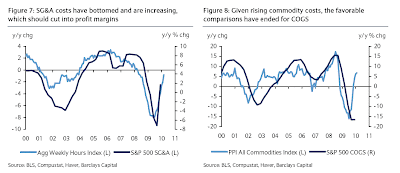Investors now expect further stock index appreciation. Almost 70% of the 100 respondents (comprised of hedge, mutual and pension fund professionals) now see the S&P 500 closing out 2010 between 1,150 and 1,300, with the weighted average outcome coming to 1,234, which is above our 1,175 expectation. Moreover, there is a slight majority (51%) who think that the market is more vulnerable to a 10%-20% rally versus a 10%-20% pullback from current levels. Most important, average cash levels have dropped to more than 6% of portfolio assets from 11% in January and 16% last July, yet greater than 60% of respondents plan to allocate more money into equities this year.On the political side also some interesting expectations:
More than 90% of those polled foresee tax increases in 2011 yet only 45% expected the Republicans to win control of the House of Representatives in November’s midterm elections. More than half thought that the US budget deficit would not become an issue for equity markets in 2H10 despite government policy missteps being the most highlighted risk to equities. Additionally, almost 70% of respondents expected growing trade friction between the US and China.Steven Wieting, the US economist at Citigroup Global Markets, writes this morning:
Click on chart to enlarge, courtesy of Citigroup Global Markets.The now routine beats of analysts’ earnings estimates should continue in the 1Q period again, with our sitting S&P 500 estimate 6.4% ahead of bottom-up Street estimates. Positive surprises in several activity measures since our February estimate suggest upside risk. Management outlooks should be more optimistic.
While estimates have been rising into results, for most non-financial firms, they still show an EPS decline from 4Q 2009 that is roughly twice the seasonal norm.
The sharp, “snapback rate” of profits should slow soon. But profits should continue to grow rapidly relative to labor income, even as the latter begins to improve. Strong revenue growth and rising labor costs are a better combination for cyclical profit gains than weak revenue growth and falling labor costs.
 So, we did touch the issue of rising labour costs couple of weeks ago. However, the US Equity strategists led by Barry Knapp at Baclays Capital, went much deeper with their analysis, and sound not too optimistic on Friday:
So, we did touch the issue of rising labour costs couple of weeks ago. However, the US Equity strategists led by Barry Knapp at Baclays Capital, went much deeper with their analysis, and sound not too optimistic on Friday:In conjunction with ... analyst earnings estimate revisions and their negative divergence from stock prices (net revisions are falling, while share prices are rising), we believe 1Q10 earnings season is unlikely to drive share prices higher. Also, margin expansion is unlikely to continue, due to increasing labor and commodity costs, and (while revenues could beat expectations) forward guidance is likely to be cautious as most companies, like the Fed staff and FOMC members, do not yet share our optimistic outlook for a typical cyclical recovery of the economy and the labor market.Click on charts to enlarge, courtesy of Barclays Capital.

Interestingly, according to guys at Bespoke Investment Group on March 26, Barclays had a bit more bullish target for S&P500 than Citigroup (well, I checked and these targets are valid as I write), but now the language at Barclays is less bullish than Citigroup?
Further on, NBER had it difficult today to announce the end of US recession ...
No comments:
Post a Comment